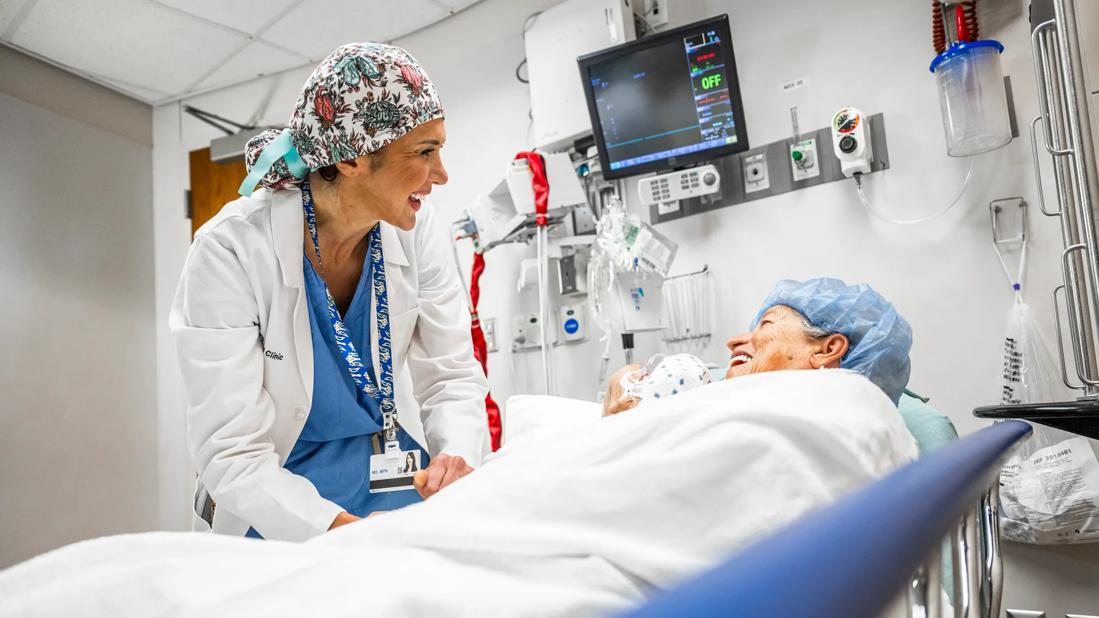What updated techniques, counseling and a changing workforce could mean

Image content: This image is available to view online.
View image online (https://assets.clevelandclinic.org/transform/4aac18f9-d0a3-47fc-b6f3-29b4d028d35f/dr-bukavina-with-patient)
Physician smiles at patient in a preoperative setting
Bladder cancer survival rates have climbed over the last several decades, but quality of life issues, particularly in women, persist. In addition to sexual dysfunction and surgical menopause, many women struggle with low self-esteem and self-worth during and following treatment.
Advertisement
Cleveland Clinic is a non-profit academic medical center. Advertising on our site helps support our mission. We do not endorse non-Cleveland Clinic products or services. Policy
Cleveland Clinic urologic oncologist Laura Bukavina, MD, MPH, has been outspoken about the bladder cancer survivorship experience for women. She says different surgical approaches, multidisciplinary management and consistent counseling are critical.
“Controlling cancer is, of course, the goal, but there must also be a greater emphasis on life after treatment,” Dr. Bukavina acknowledges.
In women, radical cystectomy often involves the removal of the bladder as well as pelvic organs, such as the ovaries, fallopian tubes, uterus, and the anterior vaginal wall. In addition to surgical menopause and the cascading health effects related to this — like poor bone health, cardiovascular risks, and vaginal dryness — dissection of genital organs and nerves can also cause sexual dysfunction.
However, more modern approaches have gained attention in recent years and demonstrate effective oncologic control while preserving anatomy.
“Our therapies have improved so much, and our surgeries are getting so much more precise that we need to shift our understanding away from the old type of thinking that we can’t do both,” she says.
In a systematic review, researchers found that only 10% of patients reported an incidence of sexual dysfunction when receiving organ or nerve-sparing cystectomy, as compared to 59% of those who received the standard cystectomy.
When advanced disease renders salvage techniques infeasible, Dr. Bukavina says involving reconstructive surgeons who can assist with vaginal reconstruction techniques, including the use of certain free flap transfers or other advanced methods, may similarly offer preservation benefits.
Advertisement
Patients sometimes require a urostomy, also known as an ileal conduit, which allows urine to drain into an external bag. This can leave patients feeling self-conscious and isolated, creating a barrier to enjoying activities of daily life.
“The effects of chemotherapy and immunotherapy can also negatively impact a person’s self-image: from hair loss, changes to weight, skin and digestive issues and more. These changes can make them feel unattractive, inadequate or even socially unacceptable,” notes Dr. Bukavina.
“It’s important to get involved with the ostomy service early on as well as cancer mental health. Help the patient reset their priorities and become more accepting of themselves and their new body image,” she advises.
The physical and emotional aspects of treatment cannot be overlooked, but especially troubling to patients, she says, is the adjustment from caregiver to patient. For example, most women who are diagnosed with bladder cancer are over age 55.
They are likely to be the primary caregivers to their spouse, grandchildren, or aging parents. The idea of slowing down and focusing on their own health is unfamiliar, even distressing. Dr. Bukavina says it’s one of the most significant hurdles when counseling patients.
Adding to this, medical oncologist Shilpa Gupta, MD, says, “Women have unique physical and emotional needs during their treatment, and we like to work together with our support teams to provide them all the resources they need to get through treatment and thrive as survivors.”
Advertisement
Though sexual function and surgical menopause are well-documented side effects in most women undergoing surgery for bladder cancer, provider awareness about this issue remains low. Many patients report not receiving preoperative counseling about this significant change in their bodies and lifestyle.
One study found that sexual function was only discussed with 13% of women prior to the surgery.
Sexual function and self-image can be taboo topics for patients to discuss, making it critical for providers to address and validate these issues proactively. Often there are support and services available: pharmacologic and nonpharmacological options may help improve sexual stimulation, and cancer mental health resources can help a range of issues related to the cancer journey.
Urology is a historically male-dominated specialty — and urologic oncology is even more so. Women represent only about 6% of the subspecialty. Cleveland Clinic will soon add one more female urologic oncologist to their staff, making it one of few centers with not one but two female subspecialists.
Rebecca Campbell, MD, a fellow in the Department of Urologic Oncology, who also completed her residency at Cleveland Clinic, will join as staff in August 2025. Her practice will include treating all urologic cancers, but her research interests are mostly focused on bladder, kidney and upper tract urothelial tumors.
She’s been encouraged by the uptick in women entering the field and says patients appreciate the opportunity to have a female surgeon if that’s what they wish. “Several patients have told me this during my training, which further reinforced my desire to pursue this career.”
Advertisement
The good news, she says, is that more women are entering the field and bringing these survivorship issues to the forefront at conferences and in research efforts. “People are looking into ways to minimize side effects and identifying potential therapies unique to women. In the next decade, we could potentially see a lot of change.”
Advertisement
Advertisement
Oncologic and functional outcomes are promising, but selection is key
Findings confirm microbial variability, offer new potential treatment strategy
Research program sets the stage for clinical trials
Retrospective study finds acceptable cancer control among most histologic subtypes with intravesical therapy
A recent case study illustrates surgical intervention for treating recurrent bladder cancer
Cleveland Clinic is first to use the device, known formerly as the UroMonitor
Retrospective study evaluates clinical upstaging during neoadjuvant treatment
Pediatric urologists lead quality improvement initiative, author systemwide guideline